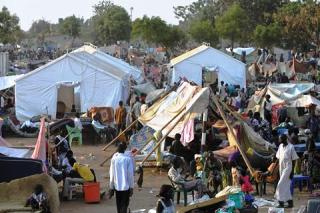WFP, partners aid nearly 500,000 South Sudanese
March 28, 2013 (JUBA) – The United Nations World Food Programme (WFP) and its partners have so far provided food and nutrition assistance to nearly half a million conflict-affected people in South Sudan, an official said.

“WFP was using a combination of airlifts and airdrops to reach tens of thousands of people in remote, hard-to-reach areas. WFP’s mobile distribution teams took advantage of sometimes-small windows of opportunity to distribute food to people in urgent need in communities isolated by conflict”, said Byrs in a statement extended to Sudan Tribune.
“The mobile teams were now being expanded to include other agencies”, she added.
The WFP official said the unrest had seriously damaged food security in South Sudan, pushing millions further into hunger and severely complicating our efforts to provide relief.
“The crisis was hurting food security even in parts of the country not directly affected by fighting, in part because of disruption to trade routes and food markets,” Byrs observed.
The WFP official, however, the agency was assisting tens of thousands of people who had fled across South Sudan’s borders into neighbouring countries. Nearly 800,000 South Sudanese have been forced out of their homes due the country’s unrest with about 85,000 fleeing to neighbouring Ethiopia while others have sought refuge in Uganda and Kenya.
“Nearly 85,000 refugees had arrived in Ethiopia, many in very poor condition with alarmingly high levels of malnutrition”, said Byrs, adding that WFP was providing specialized nutrition support for children and mothers to help them recover, and that malnutrition rates were dropping.
WFP, however, said plans were underway to assist an additional 275,000 in the following month through the use of a combination of airdrops, airlifts and river transports, especially with supplies arriving via Ethiopia.
UNICEF WORRY
Meanwhile, the UN Children’s Fund (UNICEF) warned of increasing levels of measles and polio outbreaks, but said Cholera was under control.
There are fears that the coming rains could make some areas impassable and hence increase relief operation cost in these hard to reach locations.
“Unless the situation improved rapidly and radically, as many as one million people would face even greater threats in South Sudan and neighbouring countries, including Kenya, Ethiopia, Uganda and Sudan,” said Sarah Crowe.
This week, she revealed, emergency relief supplies had gone to very remote areas, delivering whole baskets of different supplies, including food, vaccines, hygiene kits, rehydrating salts, and chlorinating tablets.
“That process would continue in the coming weeks, and the goal was to reach as many beneficiaries as possible before parts of the country were made completely inaccessible”, added the UNICEF official.
(ST).
